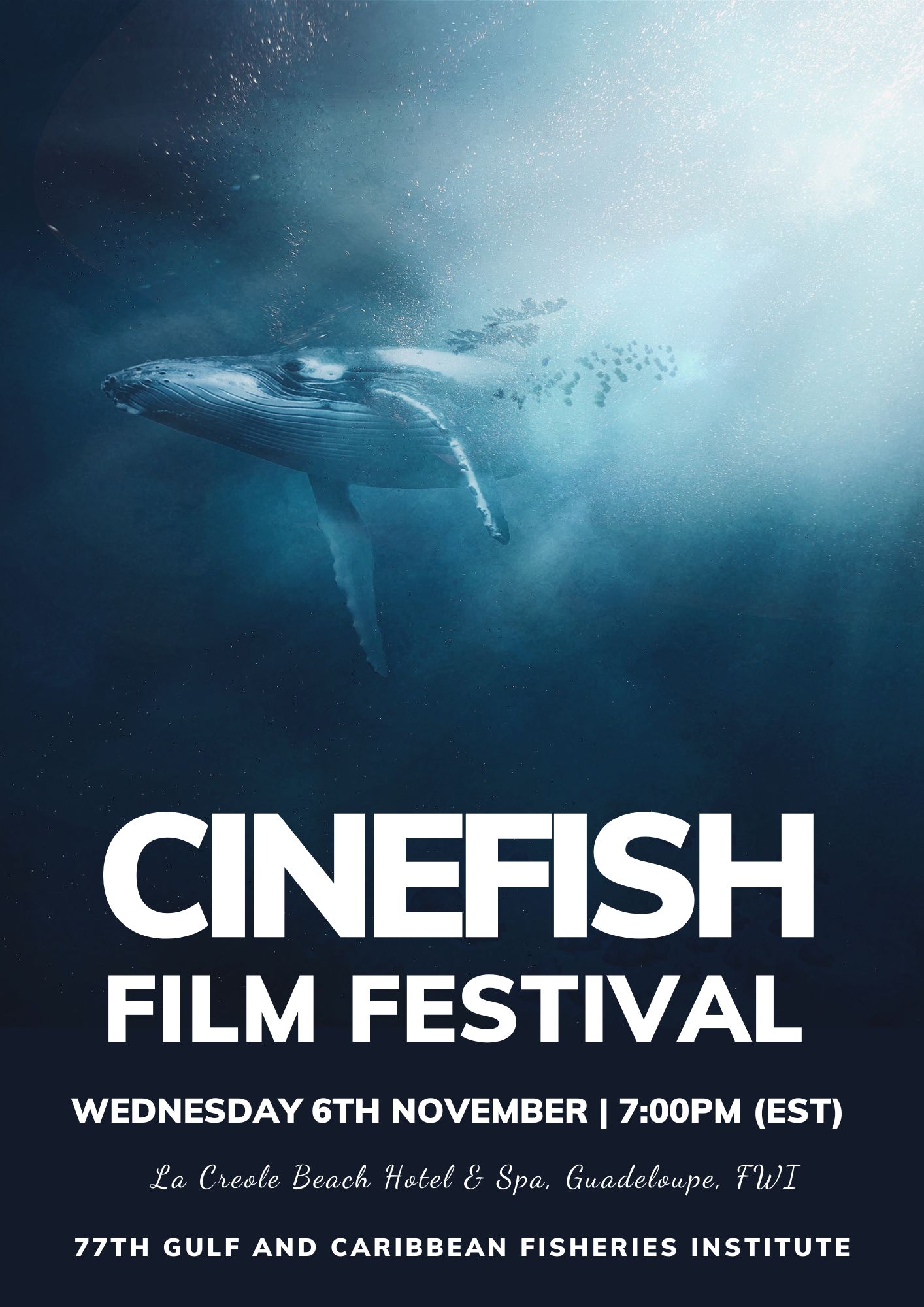Quick Links
GCFI77 – Guadeloupe, French West Indies
About the Conference
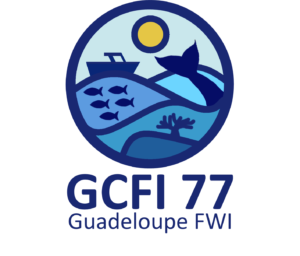
GCFI is pleased to announce that the 77th annual meeting of the Gulf and Caribbean Fisheries Institute (GCFI 77) will be held in Guadeloupe, French West Indies from 4 – 8 November 2024. GCFI is partnering with the Regional Council of Guadeloupe to host GCFI77.
GCFI77 is an Endorsed Decade Action Program with the United Nations Decade of Ocean Science for Sustainable Development.
The deadline for submission of abstracts and student award applications has been extended to July 5, 2024
Conference Theme
The theme of this year’s conference is “Marine ecosystems under pressure: reduction, reinforcement and reconciliation to improve human populations quality of life”. Join us in Guadeloupe, French West Indies, to exchange ideas and perspectives about new research, emerging issues, scientific breakthroughs, and governance related to fisheries science, industry, conservation, and management. As we look forward to sustainable fisheries, it is necessary to examine options, paths, and barriers. Considering this, we are preparing a program composed of an opening plenary, general sessions, workshops, and technical sessions related to sustainability, fish and aquatic ecosystems, fisheries and society, and innovations in fisheries. We will bring together experts, academics, policymakers, managers, and relevant organizations interested in marine issues, natural resources, sustainable fisheries, and tourism.
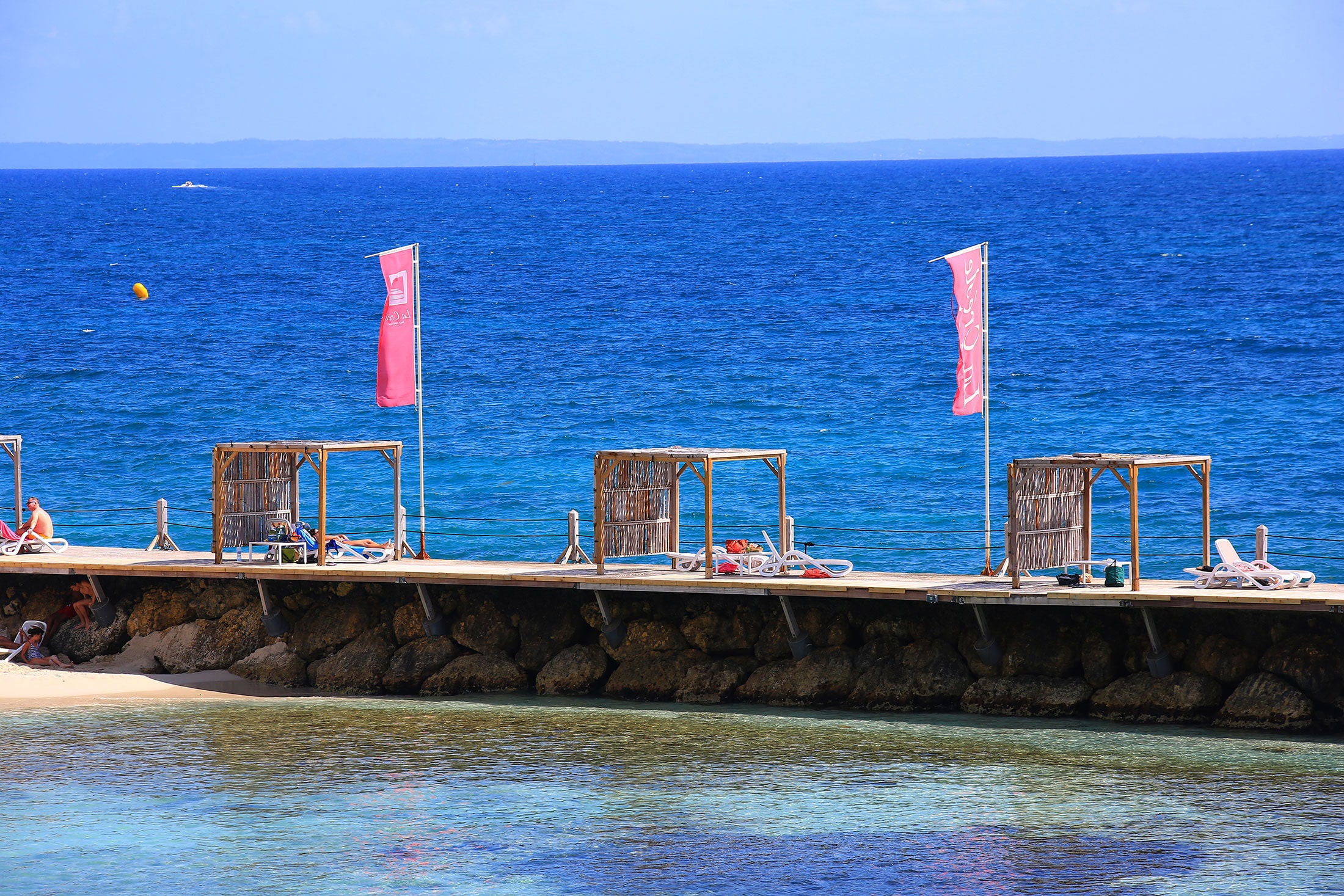
KEYNOTE SPEAKER: DR. DALILA ALDANA ARANDA
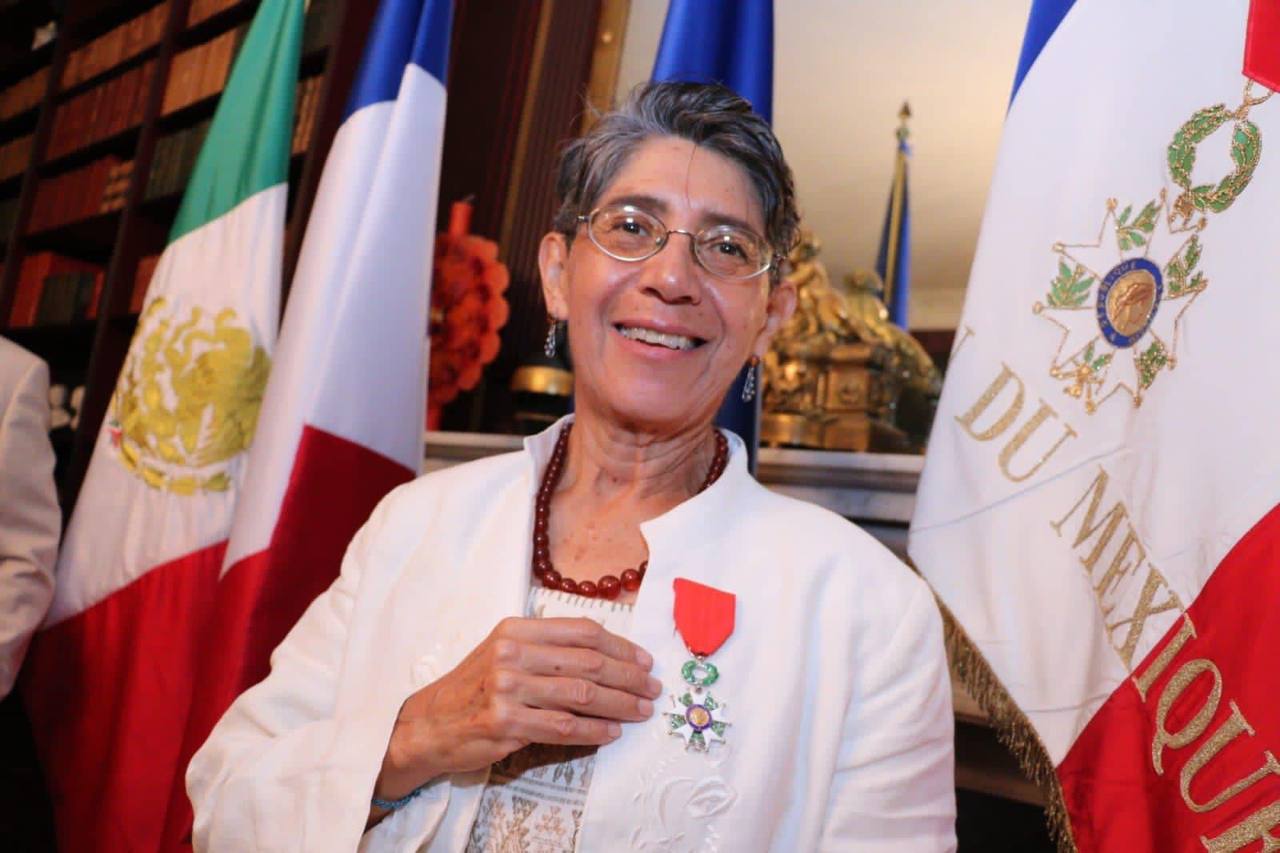
Dalila Aldana Aranda is a Biologist from the National Polytechnic Institute. Her distinctions include being the recipient of the National Award for Ecological Merit, Knight of the Legion of Honor of the Republic of France, Knight of the Academic Palms from the French Ministry of Education and the Science Communication Award from the Spanish Agency for Scientists.
Her managerial positions include being the First Woman to be the Chair of the Gulf and Caribbean Fisheries Institute and Ibero-American Coordinator of the Science and Technology for Development Program (CYTED). She is the President of the Caribbean Marine Laboratory Association and President of the Mexican Academy of Sciences.
All her professional activity has been carried out in the Caribbean, as a researcher at CINVESTAV IPN. Her research is focused on aquaculture and fisheries management as well as the effect of climate change and ocean acidification and microplastic pollution. She holds a Doctorate in Biological Oceanography, Aquaculture and Fisheries from the University of Bretagne Occidentale, France. She has a second PhD in Population Biology from the University of Marseille, France and also has the qualification to direct doctoral thesis in France (HRD).
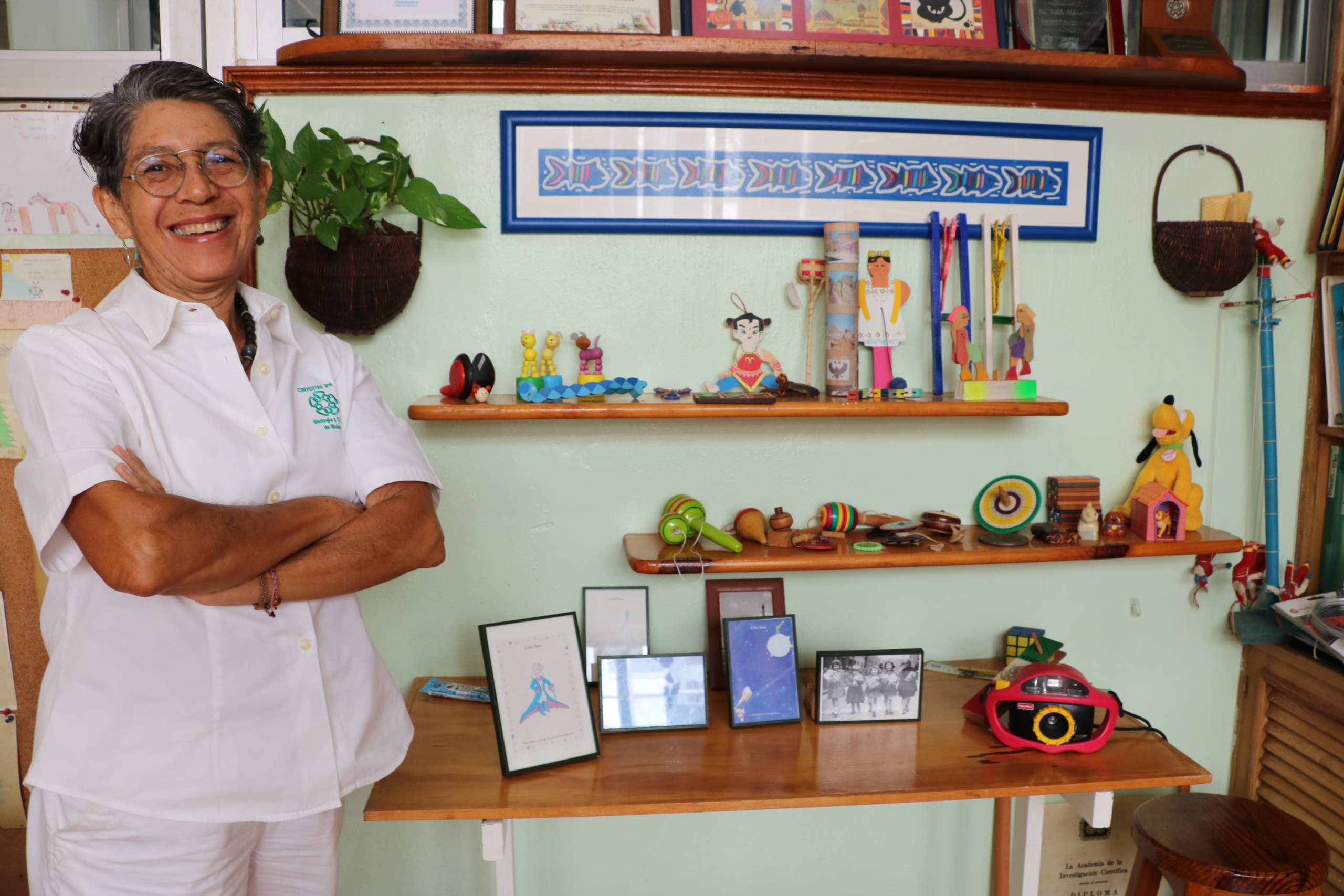
Several of her investigations have been pillars in management plans for fisheries and the social and economic importance in the Gulf of Mexico and the Caribbean. She has 80 indexed articles, book chapters and directed more than 50 graduate theses. She has an outstanding number of citations in her research discipline. She has developed extensive cooperation actions with France (French Antilles, University of Brest, University of Maine) and in the Caribbean and Latin America. Several of these activities have been carried out with the GCFI, CFMC and the Caribbean Member States. She has been a researcher invited as a scientific expert by the FAO, OAS and Caribbean Fisheries Management Council.
She has been actively involved in various science popularization and dissemination programs of the Mexican Academy of Sciences, with several programs including the AMC’s Passport to the Path of Scientific Knowledge. She has also been actively involved with the UN 11F Program, on the International Day of Girls and Women in Science.
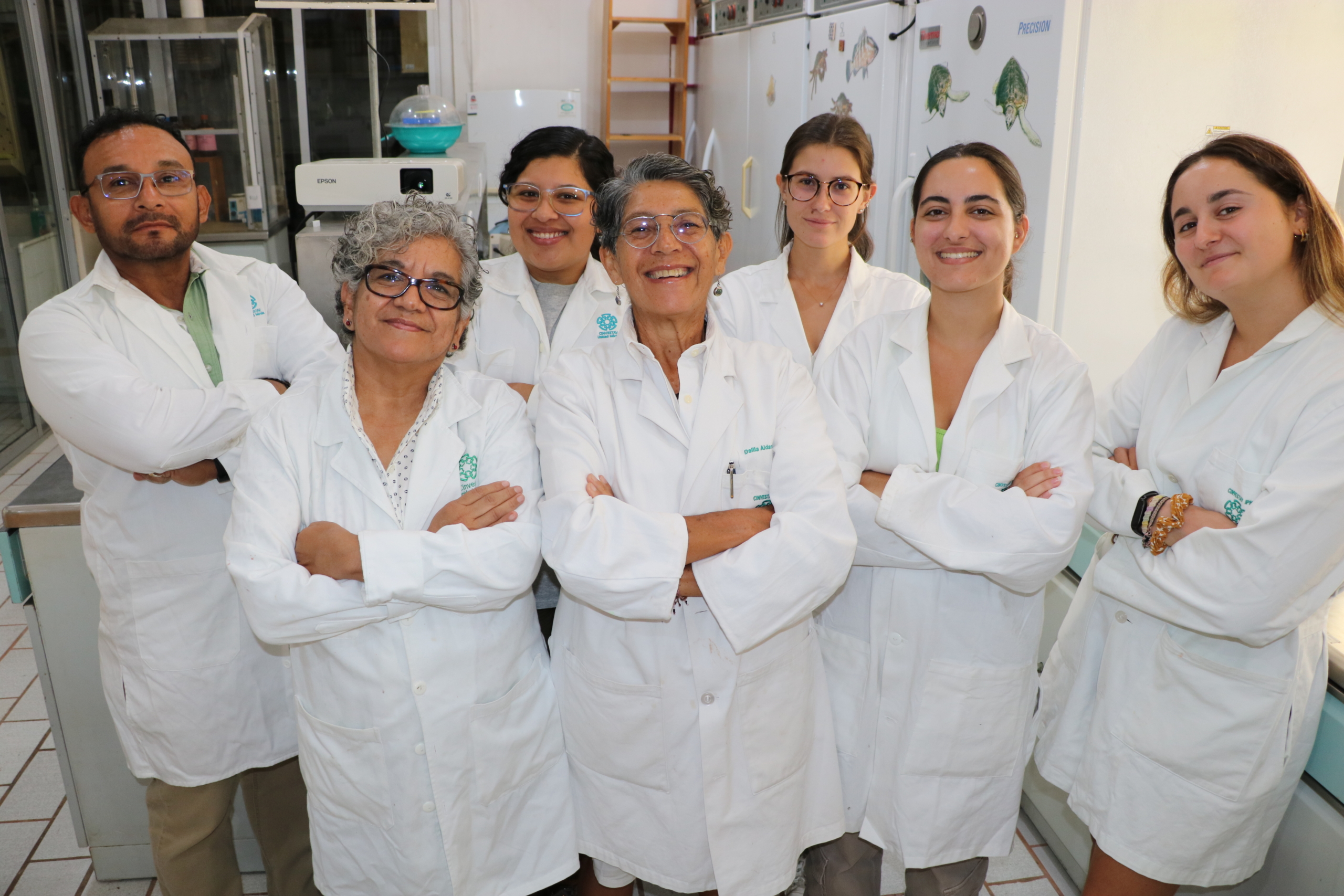
She has been a keynote speaker at several international congresses, at the World Aquaculture Congress on several occasions, at the Caribbean Academy of Sciences (CAS), the World and Latin American Mollusk Association, Aquaculture Nutrition, Applied Malacology and now at the Gulf and Caribbean Fisheries Institute. She has mounted 5 exhibitions in museums nationwide, and 2 exhibitions in museums in France. She is the author of a popular collection of 10 books on Caribbean Environmental Conservation and writes with great dynamism on environmental issues
Venue
The venue for GCFI77 will be the La Creole Beach Hotel & Spa
Hotel Address: BP 61 Pointe de la Verdure, 97190, Gosier, Guadeloupe
To make your reservation, please use the following link: https://bit.ly/4bbMEZF
Or
Apply the code GCFI24 directly on the hotel website.
This special rate is valid from 20 October to 19 November 2024
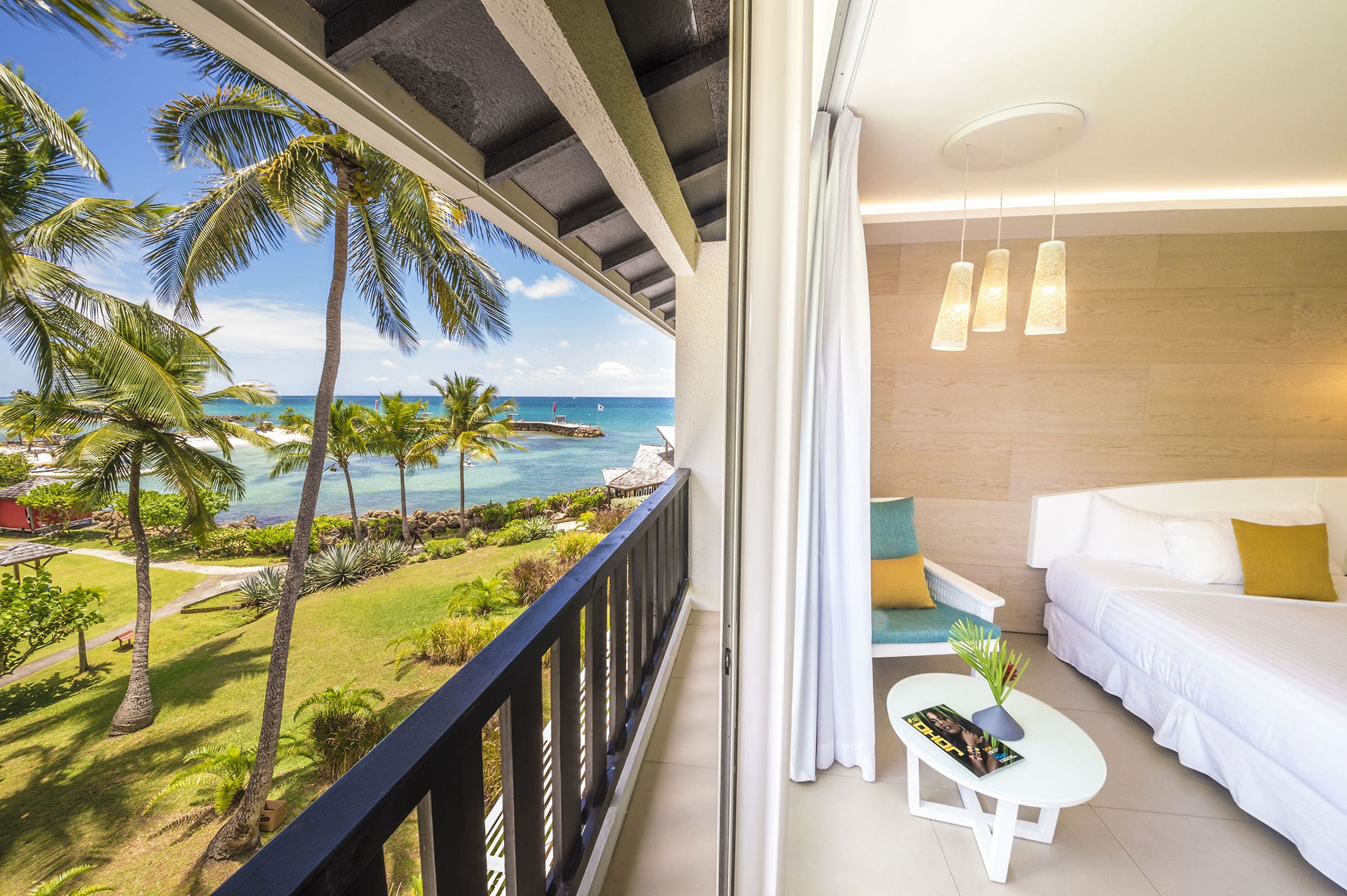
Travel Information
-
from Saint Martin french side (Grand Case airport) with Air Caraibes www.aircaraibes.com (Daily flights)
-
from Miami with Air France and American Airlines (MIA – PTP on Friday & Sunday | PTP – MIA on Thursday & Saturday)
-
from the Dominican Republic with Skyhigh (https://skyhighdominicana.com
) and Air Caraïbes (Multiple flights during the week from SDG) -
from St Barth with St Barth executive https://www.stbarthexecutive.
com/ (they also have a San Juan -> St Barth flight)
Visa Requirements
Specific countries may require a visa to enter Guadeloupe.
To determine whether you require a visa, please use this website: https://cibtvisas.co.uk/destination/glp/guadeloupe-visa
Vaccine Requirements
You must have a certificate to prove you’ve had a yellow fever vaccination if you’re coming from a country listed as a transmission risk.
For full details about medical entry requirements and recommended vaccinations, see TravelHealthPro’s Guadeloupe guide.
Registration
| GCFI77 Registration Rate: Members | In-Person (USD) | Virtual (USD) |
| Early Bird – Regular Registration | 325 | 150 |
| Early Bird – Student/Fisher Registration | 125 | 50 |
| After Sep 30 – Regular Registration | 375 | 175 |
| After Sep 30 – Student/Fisher Registration | 175 | 75 |
| On-site regular | 475 | N/A |
| On-site student | 225 | N/A |
| GCFI77 Registration Rate: Non Members | In-Person (USD) | Virtual (USD) |
| Early Bird – Regular Registration | 450 | 250 |
| Early Bird – Student/Fisher Registration | 200 | 125 |
| After Sep 30 – Regular Registration | 550 | 275 |
| After Sep 30 – Student/Fisher Registration | 250 | 150 |
| On-site regular | 600 | N/A |
| On-site student | 300 | N/A |
Call for Abstracts
The deadline for abstract submission for GCFI77 has been extended to July 5, 2024. Abstracts will be accepted in English, French, and Spanish. Abstracts are only required in one of the three languages; titles must be in all three languages. Abstracts must not exceed 250 words (275 for Spanish and French). Abstracts must be submitted online via the secure online Abstract Submission Form.
Acceptance to present within an oral or poster session requires submission of an extended abstract. Extended abstract preparation guidelines are available online. Members of GCFI are encouraged to submit full manuscripts or short communications based on presentations given at GCFI meetings to Gulf and Caribbean Research for peer review. Accepted manuscripts will be published open access at no charge to the authors through the GCFI-GCR partnership. Full manuscripts will also be accepted for publishing in the GCFI Proceedings.
Authors of accepted presentations will be notified via e-mail. Submissions intended for the oral presentation, but not granted a slot, would automatically be accepted as a poster presentation. Regardless of the format, we encourage everyone who is interested in participating to submit an abstract.
Abstracts for GCFI77 are due July 15, 2024.
Special Sessions
Marine megafauna guiding the way to improved ocean management
Rationale: Marine megafauna have no political boundaries. Their range often spans national and international jurisdiction. Growing threats are putting populations at urgent risk. The survival and safety of megafauna requires unprecedented levels of cross-boundary and cross-sectoral cooperation between science, local communities, industry, governments and international sectoral bodies. Migration corridors and movement help inform management of human activity to get towards improved protection of marine megafauna throughout their life cycle.
Goal: The goal of this session is to provide an overview of research and conservation efforts carried out in the Caribbean Sea and Gulf of Mexico regarding marine megafauna, to provide feedback on successful/unsuccessful tools, solutions and methods in order to identify gaps and solutions in conservation efforts discussions and exchanges between presenters and the audience.
Description: First, we aim to outline the latest knowledge of marine megafauna critical habitat based on distribution, migration corridors and movement and interference with human activity to better manage local and international threats, including the results of the first phase of the Interreg regional CAMAC project (Caribbean Marine Megafauna and Anthropogenic Activities) and the objectives of phase 2 and Protecting Blue Corridors. Secondly, we will explore what knowledge, policies and other opportunities and solutions are already out there, e.g. mitigation measures, Marine Protected Areas, etc. Thirdly, together we identify the needs and next steps to enable effective protection of marine megafauna, such as enhanced collaboration and harmonisation of ocean governance and how do we get from knowledge to action. The sessions will be adapted according to the abstracts submitted to the session by the technical partners listed below.
Interests: Marine mammals, turtles, seabirds, sharks and rays are iconic species of our oceans playing vital roles in the long-term health of our marine ecosystems upon which we rely for food, income, protection against climatic events and climate change effect mitigation. While efforts to address these questions are increasing, a lot of work remains to be done to improve our knowledge and protection on these species in relation to their interactions with human activities in the region. This special session intends to shed light on recent scientific and technical advances in the Caribbean and Gulf of Mexico. By inviting regional experts and encouraging lively discussions, we hope to pave the way to wider and stronger collaborations in the region, setting the scene for improved protection and conservation of these iconic species. In particular, harmonizing research and conservation efforts can lead to more effective conservation strategies that would facilitate the coordination of ocean governance across the region.
Target Audience: This session is mostly directed towards scientists, policy advisors, environmental managers, NGOs and other stakeholders involved in marine megafauna projects (fishermen, port authorities, tourism and shipping industry, etc.). Given the ecological role of marine megafauna species and their wide distribution in the region, interest for this session will go far beyond the megafauna experts alone. It will also be a great opportunity for students to share and learn about inspiring studies and meet key stakeholders for a potential career in marine megafauna research and conservation.
This session will benefit both the presenting speakers and organisations for showcasing their work to the community and the stakeholders listed above for obtaining high-level information on this crucial matter from a variety of locations in the region. This session, in line with the GCFI conference, will represent a platform of exchanges and discussions, creating or strengthening bonds between participants, fuelling the growing momentum for regional science and conservation efforts for marine megafauna.
Source of funding: This special session is funded by WWF (Dutch Caribbean team & Protecting Whales & Dolphins Initiative) and the Agoa Sanctuary – French Biodiversity Agency (OFB), and organized in partnership with Wider Caribbean Sea turtle Conservation Network (WIDECAST), the Caribbean Cetacean Society (CCS), the Regional Activity Centre for the Protocol Concerning Specially Protected Areas and Wildlife (SPAW-RAC), Birds Caribbean and the Caribbean Sharks Coalition (CSC).
Contact: Monique van de Water (WWF-NL Dutch Caribbean)
Sargassum Solutions
Rationale: Sargassum fluitans and natans are the brown free-floating seaweeds that have inundated Caribbean, Central American and West African nations. These massive influxes of Sargassum have considerable impact on these nations’ economies and local livelihoods as it hinders artisanal fisheries, causes health issues from the gasses produced during wet decomposition and resulting beach closures affect tourism.
Island nations have limited land space and so dumping the Sargassum in landfills is not a long-term sustainable solution to removing Sargassum from the beaches. Some solutions proposed outside of dumping the seaweed into landfills include:
- turning it into useful products such as blocks for building or bioplastic,
- using the biomass as fertilizer
- returning the biomass to the ocean as a means of carbon sequestrationIn this session we hope to further discuss the feasibility and scalability of these solutions and identify the challenges associated with implementing them.
Agenda:
1) Welcome and Sargassum monitoring
- Outline of the Sargassum problem and the need to divert Sargassum from rotting on beaches and landfills to products and services. (Franziska Elmer, Seafields, 10 min)
- Sargassum monitoring: Satellite and drift modelling (Marion Sutton, 30 min)
2) 2nd hour How to collect fresh Sargassum
- Sargassum collection: barriers (Joel Gonzales, ASOCEAN, Rolando Chavez Peñaherrera, DESMI)
- Sargassum collection: harvest boats (Andres Bisono, SOS carbon)
- Sargassum storage/growth: aquafarms (Franziska Elmer, Seafields)
3) Sargassum products mini expo
- 5 min talks from Sargassum product companies
- Tables with products and free walk around to engage with the companies: products samples to take home
4) Sargassum sinking stakeholder consultation
- Sinking of Sargassum for carbon sequestration (5-10 min, Franziska Elmer, Seafields)
- Deep sea research: methods, instruments (15- 20 min, Tremaine Bowman, Seafields)
- Stakeholder consultation on sinking Sargassum (20-30 min):
- Do attendees have a formed opinion on sinking Sargassum?
- What are their concerns?
- Where are the knowledge gaps?
Importance and target audience: These inundations show no signs of decreasing in the near future and the season for Sargassum influxes seems to be widening. The negative impact that the inundations have put on fishers, coastal residents and the tourism industry has been significant. As such, fishers, researchers, government representatives and policymakers throughout Latin America and the Caribbean will benefit from these solutions so that removal of Sargassum from the beaches can be useful and sustainable in the longer term.
Contact: Tremaine Bowman and Franziska Elmer (Seafields Solutions)
Special Session: Council Regional of Guadeloupe Blue Growth Policy ( 2 hours)
1. Introduction
- Promotional Video (5 minutes): A film showcasing the richness of Guadeloupe’s marine biodiversity and the key challenges of blue growth, including aerial footage and interviews with scientists and locals.
- Opening Speech (10 minutes): Address by the president of the blue economy commission.
2. Overview of Regional Policy: Detailing the guidelines, ongoing projects, and successes of the blue growth policy with visual data by the blue growth directorate.
3. Case Studies and Testimonials by various speakers on environmental protection and sustainable development projects. Includes a short film with testimonials from beneficiaries.
4. Expert Panel and Moderated Discussion: With marine biology experts, elected officials, and commission presidents, each panelist discussing an aspect of the regional policy, followed by a Q&A session with the audience.
5. Summary and Future Directions : presenting conclusions, the next steps and upcoming projects for the regional policy.
6. Closing Address: By the president of the blue economy commission to thank participants and encourage ongoing collaboration.
THIS WORKSHOP HAS BEEN CANCELLED
Innovative technology for fisheries assessment, management and conservation
Date: Sunday November 3, 2024 | 12pm – 5pm
Description:
Non-extractive and non-destructive fisheries sampling methods that capture a large sample population in a cost effective and accurate manner are crucial to modernizing fisheries assessments. Current assessments heavily rely on direct human observation, catch and release measurements, dockside interviews, and visual census of fish populations. Thus, current sampling methods require significant investments in science and management capacity that often do not exist, especially in the thousands of small-scale, data-limited fisheries operating around the world. However, rapid advancements in imaging technologies hold promise for new sampling methodologies that democratize fisheries data collection.
This workshop will focus on the use of new and evolving imaging technologies to modernize fisheries stock assessments. A case study from the collaborative SMILE (Size Matters: Innovative Length Estimates) project will highlight how citizen science scuba divers in the Florida Keys are using low-cost cameras equipped with a laser to measure fish lengths. The goals of the workshop are to: 1) learn from successes and challenges in the evolving field of imaging technologies for stock assessments; and 2) gain an understanding on how the incorporation of imaging technologies into citizen science programs can improve data for fisheries management. The workshop will provide an open discussion with the aim to expedite improvements toward these goals and to facilitate widespread data-sharing, collaboration, and continued growth in the field of fisheries assessment.
Workshop participants can attend (and present) virtually. Registrants are invited to submit an abstract (250 words) for the following presentation topics at the workshop:
- Technological advances for the collection of fish length data
- Application of AI technology to process fish imagery data
- Use of citizen science programs as a resource for the widespread collection of image data
- Image and video data management and accessibility
- Fish length data usage and transformation for stock assessments and management decisions
For more information, please contact [email protected].
The SMILE project is a collaboration between South Atlantic Fishery Management Council’s (SAFMC) Citizen Science Program, Reef Environmental Education Foundation (REEF), Southeast Coastal Ocean Observing Regional Association (SECOORA), Axiom Data Science, Scripps Institution of Oceanography Semmens Lab, University of California San Diego (UCSD) Engineers for Exploration, (E4E), UCSD Kastner Research Lab and The Nature Conservancy California.
PLEASE NOTE: THIS WORKSHOP HAS BEEN CANCELLED
The conference program features multi-disciplinary thematic sessions. Each session may have a mix of natural and social science, management, and technology related to the ecosystem or fisheries, highlighting the conference theme. Papers and posters are solicited in the following areas (other subjects not listed below will also be considered):
- Governance, livelihoods, and organizations
- Socio-economic
- Ecological and socio-economic impacts on the fisheries sector
- Cooperation in the Caribbean: Large and small actions, results, and challenges.
- Gender in fisheries
- Reefs and associated ecosystems fisheries
- Shallow and deep reef fishes
- Snapper and grouper fisheries
- Fish spawning aggregations
- Lionfish and other invasive species
- Queen conch, spiny lobster, and other invertebrates
- Marine Protected Areas Science and Management
- Pelagic ecosystem and recreational fisheries
- Continental shelf ecosystem fisheries
- Shrimp and demersal trawl fisheries
- Habitats, climate change, and coastal management
- Essential fish habitats
- Integrated coastal management
- Climate change science and adaptation
- Sargassum
- Aquaculture
- Marine Litter/Debris
- Science and Innovation
- Vision of the UN Ocean Decade
Student Awards
Outstanding Student Achievement Award
GCFI is awarding $1,500 scholarships to the best oral and poster presentations (both virtual and in-person presentations are eligible). The content of the presentation must be related to final research done by the student related to their thesis or dissertation. If already submitted, this thesis or dissertation must be no older than one year. A manuscript of the oral/poster presentation must be submitted to be eligible for this award. The award winners will receive their scholarship at the following year’s conference, to help support their participation in this meeting. Complete instructions and eligibility requirements are on the Outstanding Student Achievement Awards web page.
GCFI Travel Awards
GCFI will offer two travel awards of US$750 each to eligible students to help offset travel costs to GCFI77. The deadline for students to apply for this award has been extended to July 5, 2024. Complete instructions and eligibility requirements are on the GCFI Student Travel Awards web page. Students may apply for a travel award and for consideration for the Student Achievement Award in the same year. Students who received the GCFI76 Student Achievement Award are not eligible for a travel award.
Ron Schmied Scholarship
The Ron Schmied Scholarship, a GCFI initiative supported by the International Game Fish Association (IGFA) and private individuals, will be offered to a qualified graduate student in support of their travel to GCFI77. The Scholarship is in the amount of US$1,500, and graduate students with an interest in social, economic, biological, ecological, or management perspectives on recreational fisheries are eligible to apply. The deadline for students to apply for this award has been extended to July 5, 2024. Complete instructions and eligibility requirements for the Ron Schmied Scholarship are on the Ron Schmied Scholarship page. Students may apply for the Scholarship and for consideration for the Student Achievement Award in the same year. Students may also ask to be considered for the Ron Schmied Scholarship and a GCFI Travel Award in the same year but will only receive one award. The recipient of this scholarship must submit an extended abstract or manuscript based on their oral or poster presentation.
SCRFA Travel Award
The Science and Conservation of Fish Aggregations Association (SCRFA) will offer a Student Travel Award of US$800 to a student in the Caribbean Region to attend GCFI 77, Guadeloupe, French West Indies. Originally formed in 2000 and known as the Society for the Conservation of Reef Fish Aggregations with the mission of promoting responsible stewardship of fish aggregations, in particular, reef fish spawning aggregations, the Society modified its name in 2012 to reflect its focus on science and the inclusion of all aggregating fish species. The SCRFA Student Travel Award is to encourage and help students to work in this important area and showcase their ideas and work at GCFI.
The deadline for students to apply for this award has been extended to July 5, 2024 at which time abstracts and all supporting paperwork must be submitted. Complete instructions and eligibility requirements for the SCRFA Award are available on the SCRFA Award page. Applications and further information enquiries are to be sent to Martin Russell (SCRFA Chair/CEO) or, visit: www.SCRFA.org.
Gladding Memorial Award
As a component of the Fisheries for Fishers (F4F) Initiative, the GCFI Gladding Memorial Award (GMA) committee is requesting nominations of outstanding fishers for GCFI77. This annual award is presented to select fishers (male or females) who demonstrate, as Peter Gladding did, significant commitment to the sustainable use and long-term conservation of marine resources in the Gulf and Caribbean region. The winner will be sponsored to attend GCFI77 in Guadeloupe
You are invited to submit award nominations to the GMA committee at [email protected]. All nominations must be received by 15 August 2024 and nominators are welcome to request further information and guidance. Background information on the GMA, nomination forms with award criteria, and details of the process are available on the Gladding Memorial Award webpage.
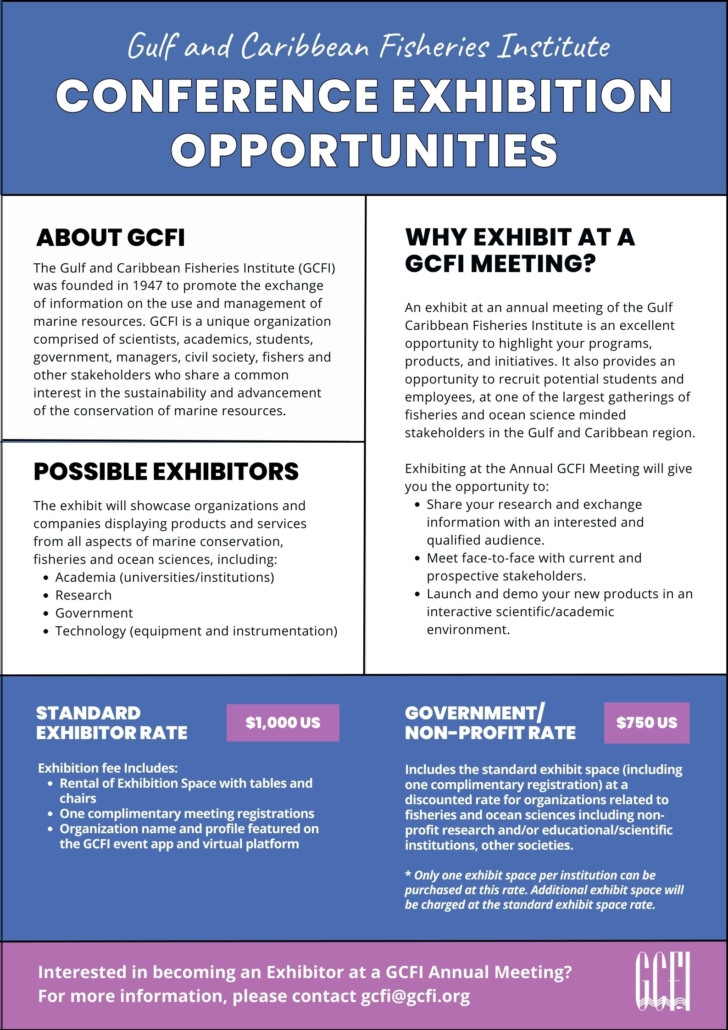

Loading…

